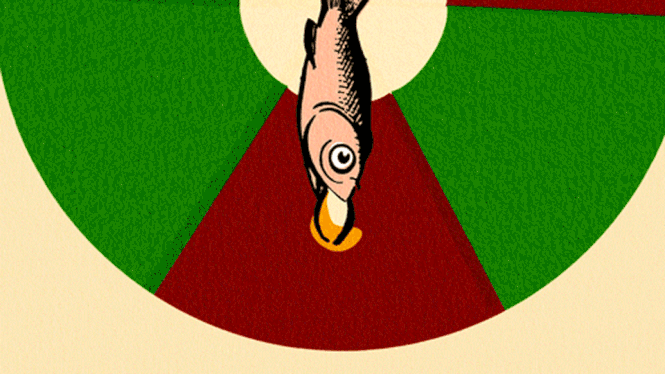
This is an edition of The Atlantic Daily, a newsletter that guides you through the biggest stories of the day, helps you discover new ideas, and recommends the best in culture. Sign up for it here.
I am appalled at the intentional cruelty and shocking incompetence that drove the Trump administration’s family-separation tragedy.
But first, here’s more from The Atlantic.
- What America’s great unwinding would mean for the world
- Beach vacationers are doing it wrong.
- David Petraeus: Afghanistan did not have to turn out this way.
“This is evil.”
Welcome to the week, and allow me to introduce—or reintroduce—myself to you. I’m Tom Nichols, a staff writer here at The Atlantic, where I’m also the proprietor of the Peacefield newsletter. If you’re a regular Daily reader, you might remember that I authored this newsletter in June; I’m back, and I’ll be writing the Daily most days of the week. Along with some of my Atlantic colleagues, I’ll be sharing thoughts and analysis about the day’s news and other issues.
I write, among other things, about the perilous state of democracy in the United States and around the world. Today, I urge you to read The Atlantic’s new cover story by my colleague Caitlin Dickerson about the origins and consequences of the disastrous decision by President Donald Trump and his advisers to curtail illegal immigration by instituting a brutal family-separation policy in which children—including infants and toddlers—were intentionally taken from their parents.
Caitlin’s intense and detailed examination shows that the family-separation policy was not a misunderstanding, or a bureaucratic error, or some sort of overzealous interpretation of otherwise sensible rules. It was, as one government figure told her, “evil,” and intentionally so: The goal of the policy was to pull children from their parents at the border as a deterrent, to inflict so much pain on people trying to enter the United States illegally that no one would be brave or tough enough to keep trying to do it.
Heartbreaking stories of children torn from their parents and then subjected to inhumane detention conditions should afflict the conscience of any decent person. But Americans should also be enraged by the completely dysfunctional nature of their own government. Even if you believe in taking a tough stand against illegal immigration (as I do) the combination of moral rot and bureaucratic incompetence produced outcomes that were far worse than the policy’s designers expected—and they already expected it to be bad.
When Trump officials such as Stephen Miller and Jeff Sessions finally got the family-separation policy under way, the immigration system’s courts, shelters, and other assets were almost instantly overwhelmed by a flood of traumatized children. The fallout was so awful and so obvious that soon, even Trump’s people began to backpedal away from it. Secretary of Homeland Security Kirstjen Nielsen—who spoke with Caitlin on the record—admitted that she did not understand how bad the situation would get and that she regretted caving to the pressure to sign the order.
The family-separation nightmare is what can happen when zealots who have no idea what they’re doing get control of the levers of a gigantic and powerful government. Not only were Trump’s aides clueless about how the immigration system worked, but they took pride in their ignorance and saw any attempt to inject facts or caution into the debate as a sign of weakness. “There’s this worship of process,” one member of Miller’s team said. “Process, process, process. Process is code for ‘We can slow down the quick impulses of a fiery political administration with no experts.’ Well, that’s not what was voted for.”
The public never votes for “process,” but that’s how governments work, and it is how, in a system of separated powers, policies are formed, funded, and implemented. But immigration was merely one of many areas in which the Trump White House regarded the Constitution and federal law as little more than annoyances. At one point, according to the notes of a senior DHS official, Trump told Chief of Staff John Kelly “to tell Nielson to, ‘Round them all up and push them back into Mexico. Who cares about the law.’”
According to this official’s notes, “silence followed.”
This silence was part of a persistent cowardice among senior figures in the U.S. government. Opponents of the policy thought that the system, or the courts, or the person in the next office down the hall would somehow stop the cruelty. But the people who wanted to do the right thing—or, at the least, knew how the immigration system actually worked—were shouted down by low-level minions such as Katie Waldman (who was soon to be Mrs. Stephen Miller). This kind of bullying, Caitlin writes, was part of “an administration plagued by insecurity and imposter syndrome.” Whether out of misplaced loyalty or fear of professional repercussions, the professionals just took it. “They made me lie,” claimed one government official who misled Caitlin when she was reporting an earlier story about the policy.
This remarkable article is a cautionary tale for Americans and other citizens of democratic nations, a story of a political monkey’s paw. When people vote for incompetent and cowardly leaders to execute policies founded on ignorance and cruelty, they will get what they asked for—to their shame and regret.
Related:
- The secret history of family separation (Leer este artículo en español.)
- America never wanted the tired, poor, huddled masses.
Join Caitlin Dickerson and Atlantic editor in chief Jeffrey Goldberg for a live discussion about the secret history of the U.S. government’s family-separation policy on August 12 at 2 p.m. ET. Register here.
Today’s News
- The three men convicted in the 2020 Georgia murder of Ahmaud Arbery were sentenced by a federal judge for hate crimes.
- President Joe Biden visited Kentucky, where severe flooding has killed more than 30 people.
- June 29 was found to be the shortest day on record since scientists began using atomic clocks in 1960.
Dispatches
- I Have Notes: Nicole Chung argues that the proposed Penguin Random House–Simon & Schuster merger would threaten the survival of indie publishers—to the detriment of both writers and readers.
- Humans Being: The new Amazon Prime series Paper Girls explores who we are to our younger selves, Jordan Calhoun writes.
- The Weekly Planet: History’s greatest obstacle to climate progress has finally fallen, Robinson Meyer writes.
Evening Read

Fish Oil Is Good! No, Bad! No, Good! No, Wait
By Jacob Stern
At first, it was all very exciting. In 1971, a team of Danish researchers stationed on Greenland’s northwest coast found that a local Inuit community had remarkably low levels of diabetes and heart disease. The reason, the researchers surmised, was their high-marine-fat diet—in other words, fish oil. Incidence of heart disease, which once afflicted relatively few Americans, had shot up since the turn of the century, and here, seemingly, was a simple solution. “I remember how exciting those studies were when they first came out,” Marion Nestle, a professor emerita of nutrition and food studies at NYU, told me. “The idea that there were populations of people who were eating fish and were protected against heart disease looked fabulous.”
More From The Atlantic
Culture Break

Read. “Hotel Earth,” a poem from our September issue.
Watch. Netflix’s The Sandman—especially if you’re a fan of the original comic books.
P.S.
The launching of the Webb space telescope has, for many of us, rekindled a fascination with space. I feel it, and I’m now binge-watching two television shows about it: The Star Trek series Strange New Worlds on Paramount+, and the Apple TV+ series For All Mankind—a “what if” alternate history of the Cold War space race. Both of them are throwbacks to a time in the late 1960s‚ when Americans took the conquest of space as their birthright, a natural extension of our technological optimism and can-do approach to the world. I won’t spoil the major plotlines of either for you, but I recommend them both. I miss the days when Americans were space pioneers, and now that the Russians have threatened to pull out of international space cooperation with the United States, I hope that the Americans take up the challenge of space once again.
Isabel Fattal contributed to this newsletter.







